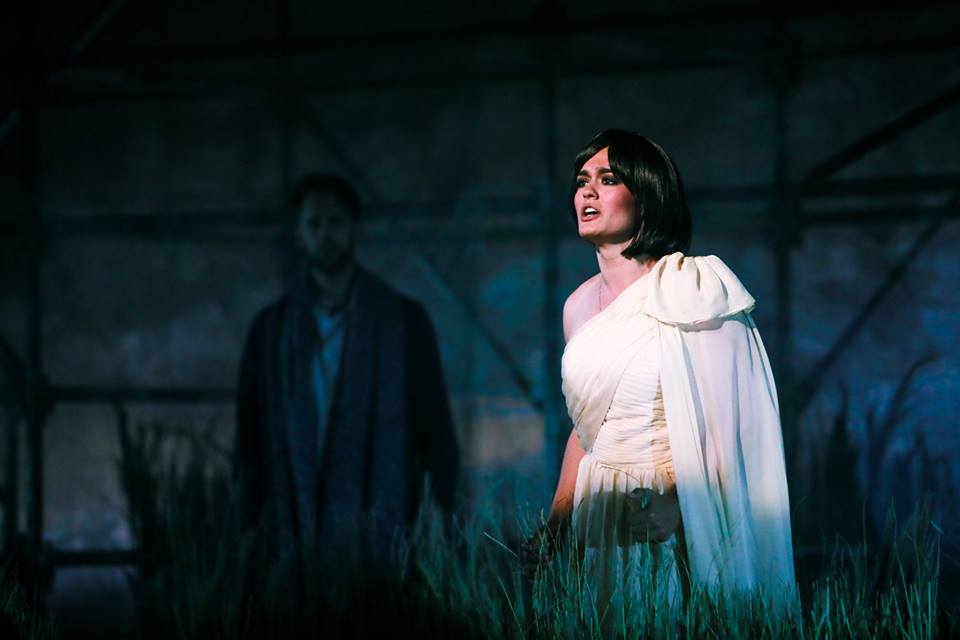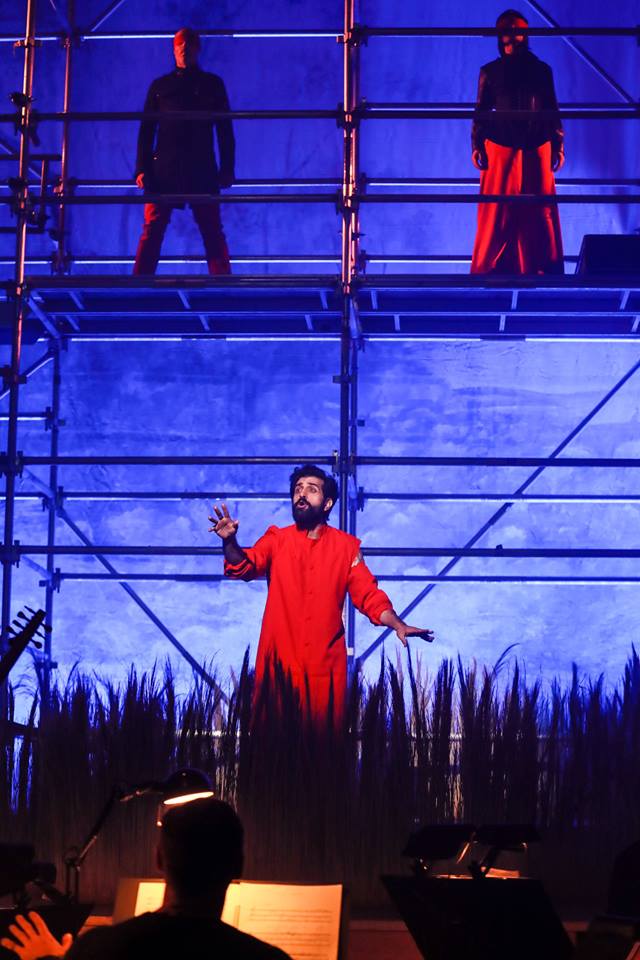Cantato a tempo dell’affetto del animo, e non a quello della mano. Sung to the tempo of the soul’s emotions, and not to that of the hand, Monteverdi instructed his soprano for his great madrigal Lamento della ninfa. Shrouded in a white dress, New Zealand soprano Natasha Wilson sang the recitative-like plaint with a raw hostility, stalking the heather-strewn stage as if compelled to retrace her steps. Her wounded first-person lament, underpinned by a descending ground bass figure, wound itself around the beautifully blended commiserations of US tenor Karim Sulayman, Danish baritone Jakob Bloch Jespersen, and Australian tenor Spencer Darby. When the piece drew to a close – with Wilson’s plangent cries subsiding to the note from which it began – the audience remained silent, sharing in the mood of despairing acquiescence.
 Natasha Wilson in Lamento della ninfa. Photo: supplied.
Natasha Wilson in Lamento della ninfa. Photo: supplied.
This latest staged venture reunites the Australian Brandenburg Orchestra with director Constantine Costi and his creative team after their fresh take on Handel’s Messiah earlier this year. Here they presented three linked, highly-ritualised dramatic tableaux exploring the human messiness of love, grief and addiction. Setting Monteverdi’s masterpiece against a scrim of Claude Lorrain’s 1682 painting Ascanius Shooting the Stag of Sylvia, this gesture to antiquity was intentionally undercut by the visible scaffolding behind, injecting a sense of artificiality as if to say you might have seen this before…isn’t it still worth seeing all the same?
Monteverdi’s Il Combattimento di Tancredi e Clorinda saw a busier stage picture with two Aikido performers acting out the crucial struggle between the two mistaken lovers. Jespersen’s Tancredi and Wilson’s Clorinda were placed on the highest level of the scaffold, blindfolded and impassive as violence was enacted at their feet. Though the Aikido warriors brought an interesting dynamism to proceedings, I wondered what the singers would have contributed if given the chance. The simplest touches were the most affecting here – a dropping of red cloth, a sympathetic sidelong glance.
 Karim Sulayman in Il combattimento di Tancredi e Clorinda. Photo: supplied.
Karim Sulayman in Il combattimento di Tancredi e Clorinda. Photo: supplied.
Doing the lion’s share of the singing was Sulayman as Testo. Although his slender tenor doesn’t have a diverse tonal palette to draw on, and he lacks the agility of some, his intense stage presence and instinctive feel for the text made him the night’s most engaging performer. His finely judged balance of speech and floated singing was a highlight. The orchestra was wonderfully supportive in this compact scena, with agile, urgent string playing and thumping pizzicati. Jespersen impressed with his full-bodied, warm baritone, authoritative and then bereft, narrowing his sound to a pale wisp as Tancredi realises the identify of his slain combatant. Employing little vibrato, Wilson was most affecting in Clorinda’s brief utterances, her conversion and death touchingly evoked.
Bloodied battleground gave way to a coffee machine and a full-cream bottle of Dairy Farmer’s in the night’s final work, Bach’s zany Coffee Cantata. No longer in the realm of Monteverdi’s subtle verse, Sulayman strode onstage and asked the audience to schweight stille, plaudert nicht, which the surtitles rendered as “shut up, stop talking”. A slim but amusing premise – a father tries to put an end to his daughter’s coffee addiction – Costi and his team placed Bach’s work in the modern day. Selfies (please let’s retire this as an onstage shorthand for millennials), a copy of the Daily Telegraph, and seemingly endless sheafs of twenty and fifty dollar notes populated the stage.
 Jakob Bloch Jespersen and Natasha Wilson in Bach’s Coffee Cantata.
Jakob Bloch Jespersen and Natasha Wilson in Bach’s Coffee Cantata.
Wilson’s fluid, crystalline phrasing was a delight, going for broke in her depiction of Leischen, a caffeine-addicted, tricksy brat, while Jespersen’s suitably choleric Schlendrian (literally German for stick in the mud) has his own poison of choice, puffing away on a cigarette at the same time as he reprimands his daughter for her filthy habit. Subtle characterisations like these by Costi go a long way. The musicians embraced Bach’s lively accompaniments, with a particularly strong flute obbligato in Lieschen’s Ei! Wie schmeckt der Coffee susse and radiant strings in Heute noch, lieber Vater. More of this please.
Bittersweet Obsessions is on at City Recital Hall, Sydney until November 1. It will play at Elisabeth Murdoch Hall, Melbourne November 4 – 5.











Comments
Log in to join the conversation.